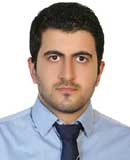Everyone, meet Sina Borzooei – an IELTS test taker from Iran. Sina is a young man in his 20s, who holds an executive position in a company. His first language is Farsi. Like some of you, Sina took two IELTS tests, Academic and General, just two weeks apart – but his scores were quite different. Thanks to a smart observation and a change Sina made following that, his Writing score went up by 1 whole band (read how he achieved this below).

“My sincere thanks for your extraordinary book and website.
1. Practice, practice and practice. It is an old adage, but really well said that “Practice makes perfect”. Every single thing and event can be your teacher: reading a newspaper or an e-book, watching an English movie, listening to the radio, etc.
2. What you have more control over are the Reading and Listening sections, so you MUST do your best in them if you want a good score. Your two other skills will be evaluated by examiners and of course you should do well in them too, but there are other factors interfering with your marks.
3. About the Listening module I should say that the most substantial skill I developed during my practicing for the exam was concentration. Unfortunately the stress during exam can easily kill the concentration and destroy your test, so a lot of practicing under real exam conditions can help. Also using real life materials for practicing can do nothing short of magic. On the test day I thought that I lost a lot of marks in Section 1 (it seemed quite difficult), BUT I continued and controlled my negative thoughts, and imagine this – the result was satisfactory.
4. About the Reading test, 3 years of studying in English helped me a lot, so my advice is read as much as you can. Skimming and scanning can also help to save your time. Time is the most essential factor in the Academic reading passages, but in the General Training ones reading with comprehension and memory can do the magic.
A vital lesson for me was: it is good if you know the meaning of words but if you don’t, it does not mean that you lose something and you cannot answer questions. In the beginning it was a bit difficult for me to control my feelings and emotions when I faced vague and unclear word in the passage, but as soon as I realized that this is an obsessive compulsive trait and it can harm my score I started to control it. I know that some of you may think that everything should be perfect while reading the passage and you should understand every single word, but bad news is these thought can have grave consequences for you and good news is it is impossible even for native users. Finally be careful about SPELLING, even very funny mistakes in plural/singular make the answers wrong.
5. In the Writing test begin with Task 2 because it takes more time and it also bears more marks. Your handwriting is very important, more than you could imagine. My handwriting was a bit large so I surely lost 1 mark in my academic test, but in my General test just 2 weeks later I got 7 in writing skills. The only change I have made was I asked for extra paper and I wrote with one line space so they could read!
Spelling is extremely important so practice spelling as much as possible and also remember that extensive vocabulary can enrich your writing and also improve your other skills. Write in pencil and try to get used to that. The first paragraph is the most important one because of its impression on the reader, so try to develop it well. Aim to cover exactly what you are asked to, avoid any off-topic writing. Learn some templates and patterns for writing and paragraphing. I used Target Band 7 and some of the present essays in the website.
6. About the Speaking test, I can easily say that think and comprehend in English, listen in English (try to translate whatever people say in your language to English), then first talk to yourself in English, then talk to others. Check the mouth position article on this website and try to cover at least the recent speaking tests topics. For coping with your stress it’s better to ask one of your friends to play the role of examiner; if that’s not possible then using a mirror is a good solution.”

